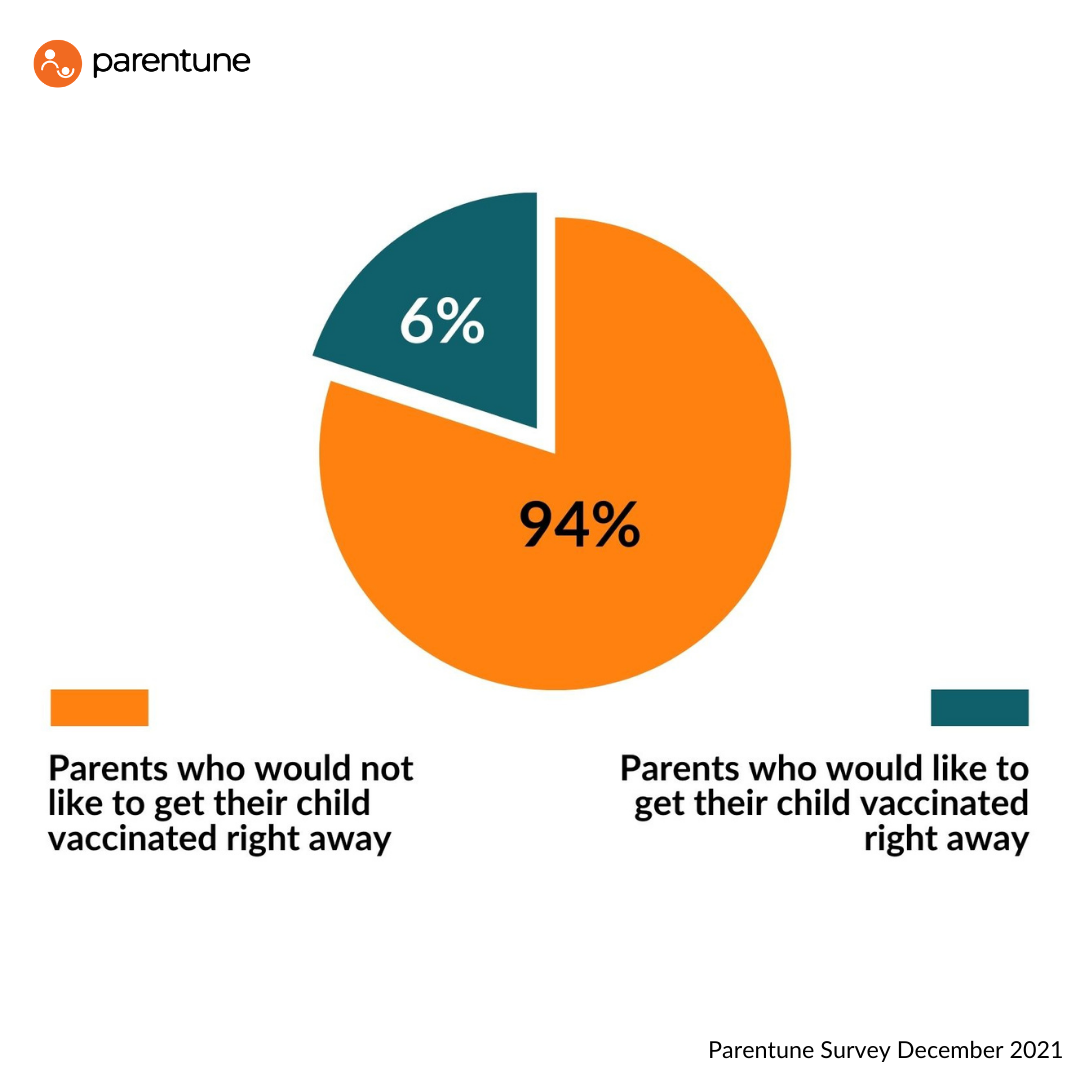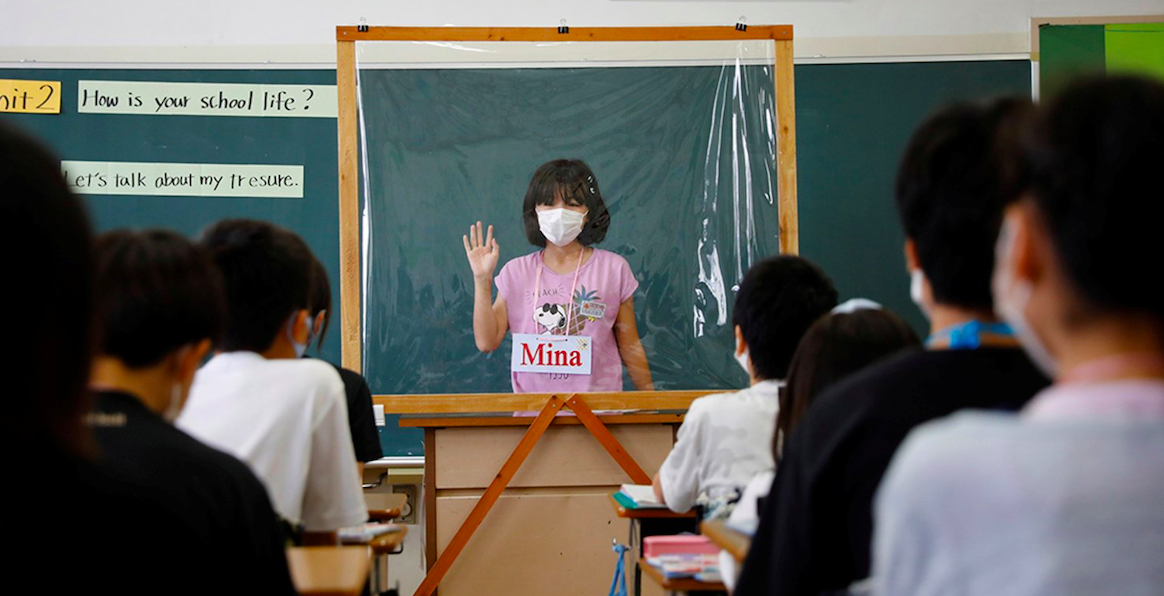Can Covid Vaccination In ...
Can Covid Vaccination In 12-18 Reduce Infections?

Can Covid Vaccination In 12-18 Reduce Infections
COVID-19 vaccine is going to be available for the 12-14 years age group by March’22. Vaccination for 15-18 years has already commenced in India. Clinical trials for children under 12 years are also ongoing, Given the vaccine availability for the 12-17 age group, would parents be getting their child vaccinated? We asked this question to 20,000 Parentune parents in a recent survey. This Blog covers parents’ opinions, Data findings from countries where under 18 years vaccination has been carried out and some more important aspects to vaccination of 12-17 years old. There are 44 Crore children (estimated) aged under 18 years. Of this, around 12 Crore are in the age group of 12-17 years, who are the first in line to receive the vaccines in the under 18 age group.
There is an early emerging pattern seen worldwide with parents’ having higher hesitancy rates about vaccinating their children in comparison to getting vaccinated themselves.
More Similar Blogs
In the US, as of December 2021, more than 2.3 million children aged 5 to 11 years had developed COVID-19 and 209 had succumbed to it.
According to a recent survey by the Kaiser Family Foundation* (KFF) in the United States, only 27% of parents of 5 to 11-years-olds are keen to immunize their child against COVID-19, whereas 30% said they definitely won’t vaccinate their child. One-third of parents said they’ll “wait and see” before deciding how to proceed.
*The KFF COVID-19 Vaccine Monitor is an ongoing research project tracking the public’s attitudes and experiences with COVID-19 vaccinations in the US.
Here are some interesting Key Findings from the research :
-
The latest KFF COVID-19 Vaccine Monitor indicates that vaccine uptake has slowed among 12-17 year-olds. About three in ten parents of 5-11 year-olds (27%) are eager to get a vaccine for their child as soon as one is authorized, while a third say they will wait a while to see how the vaccine is working. Three in ten parents say they will definitely not get the vaccine for their 12-17-year-old (31%) or their 5-11-year-old (30%).
So, in nutshell, it’s almost an equal split between those who will vaccinate their child, those who won’t, and those who will wait & watch.
-
Parents’ main concerns when it comes to vaccinating their child in the 5-11 age group is to do with potential unknown long-term effects and side effects of the vaccine. Two-thirds are concerned that the vaccine may affect their child’s future fertility. With talk of possible school vaccine mandates, over half (53%) of the parents are worried that their child may be required to get vaccinated for COVID-19 even if they don’t want them to.
What are the possible side effects?
Here is some data on the possible side effects of the vaccine on 12-17 years old. Senior vice president of Pfizer Vaccine Clinical Research and Development, Dr. Bill Gruber, revealed that there were very few serious events and no deaths during the phase 2 and 3 trials of children. He also explained that the side effects were similar to those that adults experienced.
-
The most occurring side effects in children after their second dose of the vaccine were fatigue and headache. The side effects from the first dose were less frequent,
-
This occurrence of side effects(39% and 28% from 2nd dose and first dose in children) was lower in comparison to 65.6% and 60.9% of adults from their second dose and first dose respectively. Of note were data showing that fever and chills experienced after the vaccine were lower among 5–12-year-olds than among 12–65-year-olds.
-
17.2% of children over 12 years experienced fever after vaccination. Out of those who got fever, 40% over 12 years experienced chills.
So, as per the data, children may experience some side effects after vaccination ─ part of which are their body’s way of building protection against the virus. Majority have no side effects, and allergic reactions are rare.
Possible side effects among children after COVID-19 vaccination may include:
On the arm where you got the shot:
-
Pain
-
Redness
-
Swelling
Throughout the rest of your body:
-
Tiredness
-
Headache
-
Muscle pain
-
Chills
-
Fever
-
Nausea
Should you get your child vaccinated?
The Center for Disease Control and Prevention states that the benefits of COVID-19 vaccination outweigh the known and potential risks.
Vaccinating children under 18 years can:
-
Protect the entire family ─ including siblings who are not yet eligible for vaccination and family members who may be at increased risk with comorbidities.
-
Keep them safe as and when they participate in sports, playdates, and other group activities in school.
-
Help in slowing down the spread of COVID-19.
What Do Parents Think 
We conducted a survey with a sample size of 20,000 Parentune parents out of which 19402 (94%) of parents indicated that they will not choose to vaccinate their child in the initial vaccination drive for 12-17 years old. Most of them would like to “Wait and Watch”.
The following are the underlying reasons for this hesitancy among parents in India:
-
Parents cite a range of concerns with safety issues topping the list
-
Parents are concerned that not enough is known about the long-term effects of the COVID-19 vaccine in children
-
Most of the parents want to “wait and see” before getting their teen vaccinated, they would like to see some initial post effects of the vaccine on 12-17 age group before getting their child vaccinated
-
The threat perception has reduced as the latest variant isn’t as fatal as the earlier variant in wave#2.We would like to highlight that this factor is speculative as there is no certain prediction about the next variants’ virulence.

West Bengal govt wanted 85% vaccination cover for teens before reopening the schools.
What precautions should your child’s school take?
Please watch this video from Parentune’s Founder on key things your child’s school can implement. Some of the practical measures that schools should take include:
-
Plan the start and close of the school day in a way so that they do not happen at the same time.
-
Staggering mealtimes, and having meals in highly ventilated/open spaces
-
Moving classes to temporary spaces or outdoors
-
Holding school in shifts, to reduce the class size
-
Instituting a clear tracing mechanism and protocol
Administrators should look at opportunities to improve hygiene measures, including handwashing, respiratory etiquette (i.e. coughing and sneezing into the elbow), physical distancing measures, cleaning procedures for facilities, and safe food preparation practices. Administrative staff and Teachers should also practice physical distancing, school hygiene practices and Contact tracing.
Status of vaccination for children aged 12+ in other countries
In many countries of Europe and America, Covid vaccinations are being given to children above the age of 12 years.
|
Country |
Age Group |
Vaccine Name |
Dose |
|
UK |
12-15 |
Pfizer |
one |
|
Denmark |
12-15 |
Pfizer |
|
|
Spain |
12-19 |
Pfizer |
|
|
France |
12-17 |
Pfizer |
|
|
Germany |
12-15 |
|
|
|
Sweden |
12 to 15 |
|
two |
|
Norway |
12 to 15 |
Pfizer, Moderna |
Two |
|
USA |
12+ |
Pfizer, Moderna |
Two |
|
Canada |
12+ |
|
|
|
Chile |
6+ |
|
|
|
China |
3+ |
Sinovac vaccine |
|
|
Israel |
5-17 |
Pfizer-BioNTech |
|
Here are some interesting data related to the vaccination of 12+ in other countries
-
As of September 2021, 66% of children (aged 12+) in France have been vaccinated in single doses and 52% are fully vaccinated.
-
France has made it mandatory for all adolescents to present a vaccination certificate or negative Covid test certificate before entering a cinema hall, museum, restaurant or indoor shopping center.
-
In Norway, as of September 2021, 42 % of children aged 12+ have been given the first dose and 32 % have been given the second dose.
-
School boards in the US made vaccinations mandatory to attend classes for children aged 12+, although some parents objected to this.
How safe are the children who did not get the Covid vaccination?
According to the US Centers for Disease Control and Prevention's Advisory Committee, children aged 12 to 18 years who had received both doses of the vaccine were 91% more effective in preventing corona infection.
95 percent of the children admitted to the hospital after being infected with corona were not Covid vaccinated. Vaccinated children did not face cardiovascular or respiratory problems, while 39% of unvaccinated children had such problems.
The Phase II-III clinical trial of Corbevax, which has been approved for children aged 12+ in the country, was approved in September last year. The Corbevax vaccine will be delivered into the body through a muscle and will need to be taken in 2 doses over 28 days.
Parents are hesitant about their child taking the vaccine right away, fearing side effects. Parents want to observe the efficacy of the vaccine for some time before getting their child vaccinated. From what has been seen as a trend in other countries, It’s not uncommon for parents to wait and watch. It doesn’t mean that parents don’t want their child to get vaccinated, but it does point to the fact that the majority of the parents (94% in comparison to 60% in the United States) don’t want their child to get the vaccination in the first drive
Be the first to support
Be the first to share
Comment (0)




